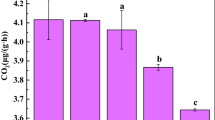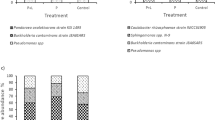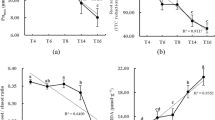Abstract
DURING an examination of the breakdown of organo-phosphorus compounds by soil micro-organisms it was found necessary to determine phytase activity in a large number of isolates. The following modification of a recently published technique1 for the detection of glutamic acid decarboxylase in bacteria proved suitable for this purpose.
This is a preview of subscription content, access via your institution
Access options
Subscribe to this journal
Receive 51 print issues and online access
$199.00 per year
only $3.90 per issue
Buy this article
- Purchase on Springer Link
- Instant access to full article PDF
Prices may be subject to local taxes which are calculated during checkout
Similar content being viewed by others
References
Stewart, D. J., J. App. Bact., 26, 75 (1963).
Mehta, N. C., Legg, J. O., Goring, C. A. I., and Black, C. A., Proc. Soil Sci. Soc. Amer., 18, 443 (1954).
Author information
Authors and Affiliations
Rights and permissions
About this article
Cite this article
GREAVES, M., ANDERSON, G. & WEBLEY, D. A Rapid Method for Determining Phytase Activity of Soil Micro-organisms. Nature 200, 1231–1232 (1963). https://doi.org/10.1038/2001231b0
Issue Date:
DOI: https://doi.org/10.1038/2001231b0
This article is cited by
-
The absorption of inorganic phosphate from 32P-labeled inositol hexaphosphate by Eriophorum vaginatum
Oecologia (1991)
-
Microbial mineralization of organic phosphate in soil
Plant and Soil (1984)
Comments
By submitting a comment you agree to abide by our Terms and Community Guidelines. If you find something abusive or that does not comply with our terms or guidelines please flag it as inappropriate.



